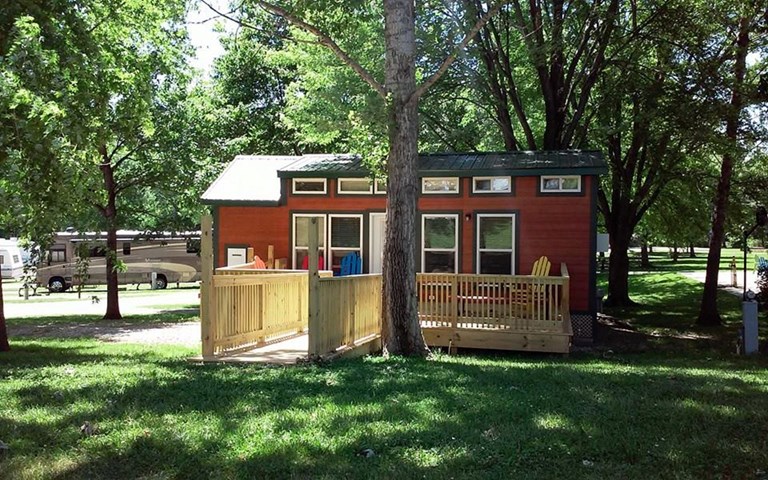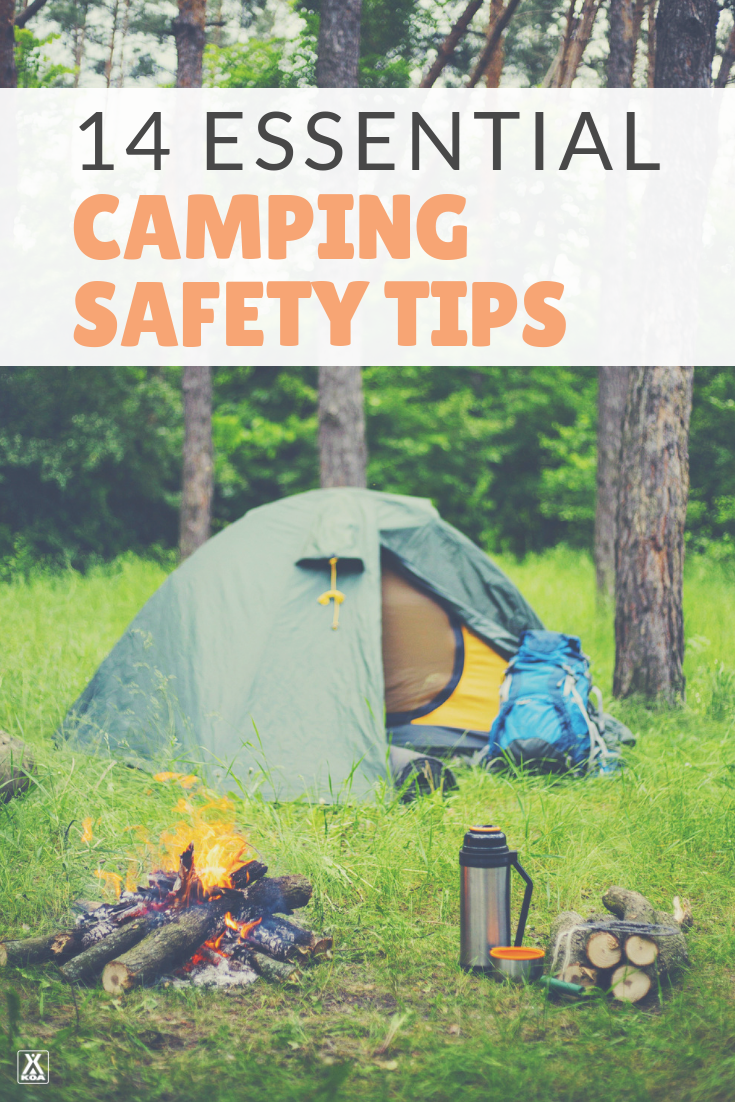Your cart is empty!
Make checkout easy by booking all your reservations at once. Add your sites from different campgrounds into your shopping cart* and then choose checkout.


Though fun is of the highest priority when adventuring in the great outdoors, there is one thing that is of even greater importance: safety.
Safety should always come first when you’re camping, as it only takes one mishap for your entire camping trip to be ruined.
Since that’s the last thing you want to happen, be sure you read on for our camping safety tips. With the below knowledge in your back pocket, you’ll be able to have a fun, safe, and memorable camping trip.
Ensuring the safety of you and your family while camping begins before you even get in your car.
Proper planning is essential to keeping safety in check.
It’s hard to know what you should bring camping with you if you don’t do some research on what the area is like.
Will you be camping near an ocean? Or will you be in the desert? The gear you need to bring in order to be safe somewhere like the desert is very different than what you’ll need in the forest.
What creatures do you need to be on the lookout for? Will you be somewhere that potentially has bears? Or are mosquitos going to be your biggest nemesis? Either way, you want to be prepared to ward off whomever or whatever may try to spoil your fun.
Few things can ruin a camping trip quicker than a downpour when you weren’t expecting it.
Rain doesn’t have to turn things from sweet to sour, as long as you are aware ahead of time there’s a chance the rain may make an appearance.
Not only will an unprepared rain cause moods to turn quickly, it can also be dangerous if you’re caught in the wrong place at the wrong time.
Something such as a thunderstorm can make you incredibly vulnerable if you are not careful.
To avoid any of this happening, check a few different sources to see what weather you can expect on your trip.
And, it may be a good idea to bring some extra gear just in case the weather man didn’t predict correctly.
A first aid kit is a non-negotiable when you’re camping.
There is much you don’t have control of in the wild outdoors, so you always want to be prepared if something goes wrong.
You can either purchase a first aid kit or put your own together. Whatever route you take, make sure your kit has the following:
Though this may not seem like something that pertains to safety, it is.
Consider who you are taking on your trip, and what kind of amenities they’re going to need.
For example, if you are camping with someone elderly, or someone who has medical issues, then it may not be the best idea to opt for tent camping.
You may instead want to go for cabin camping that provides more comfort and support. KOA’s Camping Cabins give campers a way to enjoy the outdoors with the comforts of home right there.
Regardless of what way you decide to camp — whether in a tent, an RV, or a cabin — KOA has the amenities you need to make your experience a stellar one.
From the extra space and peacefulness a camping cabin brings, to the top-notch tent camping sites with picnic tables, nearby restrooms and more, KOA is your go-to for camping, whatever your style preference.
A camping trip would absolutely not be a camping trip without a campfire and some s’mores.
However, campfires are incredibly dangerous if you aren’t careful.
Thus, it is crucial that you practice fire safety, and that you make sure the other people you’re camping with do the same.
Here are some ways you can ensure that you are putting forth safe fire practices when camping:
The damage that the sun can do to you goes far deeper than a bad sunburn, though a bad sunburn is enough to ruin an entire camping trip.
To keep from suffering either the short or long-term effects of the sun, properly protect your skin.
Regardless of whether the sun is out, put sunscreen on. You may not know this, but just because the clouds are there does not mean that you are blocked from the sun’s UV rays.
Know that the middle of the day is when the sun tends to be the most intense, and follow these sun safety guidelines:
While things such as sun and fire safety are quite obvious when camping, something that people don’t think about much is food safety while camping.
One of the reasons food safety is so important to follow is to avoid food-borne illnesses.
Here’s how you should handle your food when camping to avoid any potential sickness:
The other reason that food safety is of such great importance is to keep any unwanted wildlife away. There are few things that will attract a bear to your camp more quickly than food that’s been left out.
Here are the best ways to store your food to keep bears and other creatures away:
There have been tragic cases of either people getting hurt from wildlife, or wildlife getting hurt from humans interacting with them.
One such sad case took place in 2016 in Yellowstone National Park when a baby bison was forced to be euthanized after tourists thought it looked cold, and put it in the trunk of their car. After coming into contact with humans, the mother rejected the baby and it was unable to survive on its own.
This tragic story doesn’t need to happen again, and won’t, as long as you are clear on the boundaries of wildlife when camping:
Parasites are not something you want to deal with when camping, or ever.
The ideal situation would be to bring in enough water to last your entire camping trip, but if that is not an option, then make sure you have a way to purify it.
There are a couple of different ways you can do this:
In order to stay properly hydrated, you need to be drinking water throughout the day, even if you don’t feel like you are thirsty.
Make sure that you are not only purifying your water to drink it, but also to wash dishes and to wash any foods.
Most people only think about warding off annoying mosquitoes when they head out camping. While those bugs are the ultimate pests, there are a number of other insects you need to watch out for that can cause you a lot more problems than just an itchy bite.
Ticks are a major concern when spending time in the outdoors because they can lead to the development of Lyme Disease. Always be mindful to check for ticks every day, particularly in areas where you wouldn’t think ticks would hide. The quicker you are able to remove ticks from your body, the less likely they are to cause serious damage to your health.
In addition to checking for ticks, if possible, wear clothing that covers as much skin as possible. Long sleeved shirts, pants, and socks are recommended if it isn’t too hot.
Keep insect repellent on hand, and apply often.
Take a bit of time before you leave on your camping trip to get to know some of the local plants where you’ll be, and what ones you should watch out for.
This is especially true if you are planning to camp and hike with children. Poison ivy and poison oak are the two main ones to be on the lookout for, but there are likely other poisonous plants in the area you will want to steer very clear of.
And whatever you do, do not eat anything off any trees or bushes!
As much as we have all come to love the convenience and ease of using maps on our phone and other GPS systems, there are times when technology fails, and you may find yourself lost in the wild.
To avoid this from happening, pack an old fashioned map. There’s bound to be that one time that you’re thankful you did.
Though a major part of camping is about relaxing and enjoying yourself, it is important that you always remain on alert of your surroundings. You are in the wild outdoors, after all.
You are also on vacation, so be sure you don’t overdo the indulgences, and pay attention to what your body is saying.
This one should be a given, but just in case you’re feeling overwhelmed about all the safety tips for your camping trip, we want to remind you to have fun.
KOA is here to help you with everything from finding the perfect campground, to curating the perfect camping experience, to returning for many more adventures.
So be safe, have fun, and enjoy the great outdoors.
Leslie, a.k.a. Copy Girl, is a copywriter who gets butterflies from telling stories through words.
Her voice comes from a place filled with passion, dreams, and lots of sugar. “Cake over steak” is her go-to motto.
With over 10 years of experience in crafting words, and years of embarking on travels that have taken this Montana girl to some incredible places, Leslie love the adventures of both body and mind her writing takes her on.
Everywhere she goes, she takes this advice with her:
“Hold on to your divine blush, your innate rosy magic, or end up brown.” – Tom Robbins, Jitterbug Perfume
To see what Leslie’s up to in the writing world, visit her website here.
That doesn't mean this area has to always be empty. When you start reviewing camping options, your history will display here to help compare sites and find the best stay. You will be able to share your stay information with friends or family and save it for a later time if you have a KOA Account.
Make checkout easy by booking all your reservations at once. Add your sites from different campgrounds into your shopping cart* and then choose checkout.